Spring is Here, but Where are Our Tagged Herons?
Spring is here, and we are patiently waiting for our tagged herons to return from their wintering areas. Here's an update explaining why we haven't seen them yet.
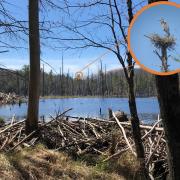
Beaver Flowage Attracts GPS-Tagged Heron to Nest
Have you heard of Cornelia, an adult female great blue heron tagged with a GPS transmitter, who nests in Maine and migrates to the Bahamas for the winter? She is one of ten other herons who’ve been equipped with GPS transmitters by Maine Department of Inland Fisheries and Wildlife (MDIFW) to learn more about heron movements, habits, and habitats in Maine and beyond. The project began with the help of a Maine Outdoor Heritage Fund grant and many partnering schools, and is part of MDIFW’s ongoing efforts to understand the status of great blue herons in the state – especially along the coast where their population has declined by 89% since the 1980s.
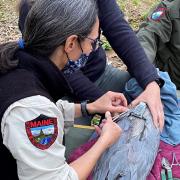
First Maine Island-Nesting Heron Tagged with GPS Transmitter
IFW technician Brittany Currier holds tagged great blue heron just before release.
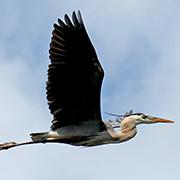
Harper Wows Us Again!
Harper, the GPS-tagged Great Blue Heron, has done it again! Last fall she impressed us with her 38-hour nonstop flight over the open ocean. This year, she has gone above and beyond, flying for 68 hours and 2,030 miles nonstop from Quebec to Georgia.
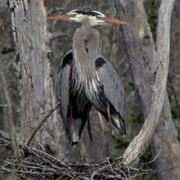
A Quick Look Back Before the 2020 Heron Watching Season Begins
How about we forget about what’s going on in the crazy world for just a moment and think about the month of June 2019, which is when Heron Observation Network Volunteers conducted most of their colony visits last year.
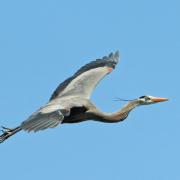
Harper's Marvelous Migration Sparks More Questions - Here Are Some Answers
For those who may be late to the party, “Harper” is an adult female great blue heron who was captured and tagged with a GPS transmitter in Harpswell, Maine, by IFW biologists with the help of students from Harpswell Coastal Academy and volunteers with Harpswell Heritage Land Trust.
Exploring Our School's Very Own Heronry
On October 9th, our Environmental Studies class at Nokomis Regional High was fortunate enough to have wildlife biologist, Danielle D’Auria, come to our class and talk to us about the Great Blue Heron nests that are located on our school grounds. We took a trip to the Heron Rookery right on our school property, where we were able to tag and measure 33 nesting trees and identify 39 heron nests.
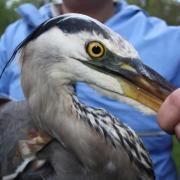
Heron Tagged in Harpswell Surprises Biologists
For nine students at Harpswell Coastal Academy, Wednesdays in May meant donning knee-high boots, venturing to a nearby wetland, and hoping for signs a hungry great blue heron had been there. As part of a spring class elective, these students were dedicated to helping MDIFW ultimately tag a great blue heron with a GPS transmitter as part of an ongoing project to better understand heron habits in Maine.
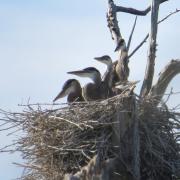
Volunteers Contribute a Decade to Heron Monitoring
In what felt like a blink of an eye, we finished up our tenth year of monitoring great blue heron colonies with the help of Heron Observation Network volunteers. These citizen scientists often braved mosquitoes and black flies and hiked through thick swampy forests to get a good view of great blue heron nests, which were often in snags in the middle of a wetland, sometimes in what felt like the middle of nowhere.
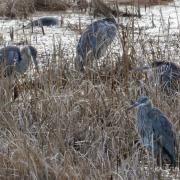
How to Help an Injured Heron - Safely!
There is a small portion of our Great Blue Heron population that overwinters in Maine, but all those I have seen or heard about are juveniles. Quite often those that stay are not in great condition and may even be starving. A juvenile great blue heron captured accidentally by a beaver trapper this November was not injured in the process but was brought to Avian Haven - one of Maine’s top-notch bird rehabilitators - because it was noticeably thin.
Keep In Touch!
Enter your email or mobile number to receive the latest news from MDIFW.